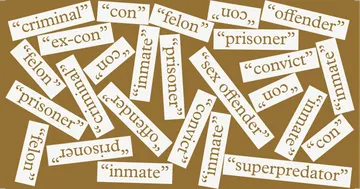Most federal prisons have a designated area for inmates to pursue legal work: a legal library/typing room. Though we are in the 21st century and digital tech is everywhere, the Bureau of Prisons, or BOP, is dead set, come hell or high water, on keeping legal libraries/typing rooms firmly lodged in its halcyon days of glory: the 1980s, when Congress, in its infinite wisdom, created mass incarceration.
Yes, there are computers. But they run on simplistic, primitive systems that may have been the cat's meow 16 years ago, but are in desperate need of an upgrade.
But the most striking anachronism in the legal library is the electric typewriter, a true icon and state-of-the-art staple of the 1980s. It's always fun to watch the faces of criminal justice students touring the prison, wide-eyed and fearful. We are the wild beasts in the zoo that they've been told about and here we are in our natural habitat, here in the legal library fighting our cases on typewriters. They're probably thinking, Good Lord! How do you edit? How do you copy/paste? How do you spell-check?
Well, you don't. You type. You make mistakes. You retype. You make mistakes. You retype. The machine malfunctions. You retype. You type “nad” instead of “and,” “alwyas” instead of “always,” and my personal favorite: “shit” instead of “this.” On a word processing program all such mistakes would be auto-corrected. Here we proofread and proofread and proofread. Ever hear of that old Greek myth about Sisyphus, the guy who had to keep rolling a stone up a hill only to have it roll down again for all eternity? Proofreading is crucial. Silly mistakes could easily be overlooked. A “MOTION TO VACATE” could easily end up as a “NOTION TO VACATE,” a notion all inmates entertain at one time or another.
And the machines themselves … Lord, the machines! IBMs or Swintecs or Brothers. They are constantly and miserably in need of adjustment and repair, constantly neglected and overused. Malfunctions go unaddressed for months. Many are the curses followed by the sounds of paper being violently crumpled as someone, near the end of a 10-page appeal finds a typo on page four. Because of the error, a repeated phrase, or a missed sentence, he may be forced to retype six pages. Expletives abound. Chairs have been tossed across the room. The chairs, plastic and unbreakable, are no doubt a substitute for what one would like to see happen: a typewriter flying into a wall and shattering into a thousand pieces.
The legal library/typing room is where the optimism of naive, hopeful, recently incarcerated inmates goes to die. Appeals take weeks, months and years to prepare by jaded jailhouse lawyers taking stamps or commissary grocery as payment. Ninety-nine percent of those appeals and so-called “administrative remedies,” the federal system's useless complaint forum, come to nothing. I see them come in, the “NGs”—the new guys—fresh off the bus. They show up in the typing room, all eager and bushy-tailed. Surely, justice is on their side! The jailhouse lawyers see them too, like crocs moving in on the gazelle drinking at the river's bank, the NGs, good for a few boxes of Duplex Cookies or a couple of salami logs or maybe a jar of strawberry jam. Or at least a flat book (that's 20 stamps for you non-incarcerated folks) if nothing else.
Also, as everywhere else in prison, there are politics. I don't mean the Democrat/Republican, Washington, D.C., kind, but the politics of control which are a by-product of overcrowded prisons and the clustering of criminal minds. There are never enough typewriters in the BOP legal libraries to accomodate the need. The prisons where I've served time—or had it served to me—average a ratio of one typewriter per hundred inmates. And that's on a decent compound.
Usually there are typing room leeches (sometimes jailhouse lawyers) who are always there, sometimes with three or four “assistants” hogging the machines and transforming the typing room into their own private legal office. These leeches purport to be working on “serious,” “time-sensitive” cases, yet year after year they and their clients remain in prison. They are as much a fixture of the typing room as the typewriters. On more than one occasion I've seen jailhouse lawyers come to blows over a machine, calling each other incompetent hacks, accusing each other of ruining inmates' cases and being hauled off to the SHU, usually for several weeks, giving many of us, finally, a shot at getting our hands on a typewriter.
For the brave and persistent typist, it is imperative to develop work-arounds and to have plenty of white-out available for those double-striking keys or skipped spaces within words (as in: consti tu tio nal vio la tion) that require re-typing. And, by the way, on many compounds white-out is considered contraband.
Like everything else in prison, the typing room is not for the faint-hearted. Only the stronger species survive.
Fernando Rivas, 67, is a Cuban-born Juilliard School graduate and the recipient of two Emmys and one Grammy for television work. In 2016, his poem, “300 Min.” received an Honorable Mention from PEN America. In 2019, he was the winner of the Insider Prize Short Story award from American Short Fiction. He is serving a 15-year sentence for charges related to child pornography at FCI-Seagoville in Texas.
